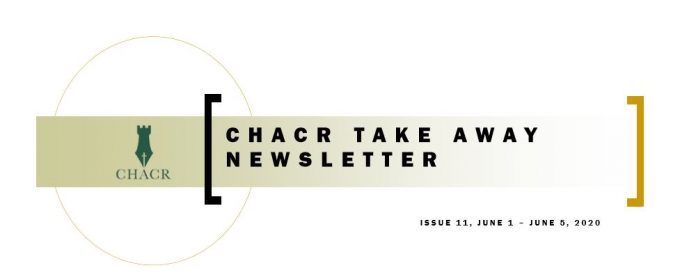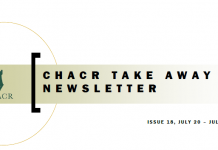This is the eleventh issue of the weekly CHACR Take Away newsletter. In these newsletters, you will find links to the latest products by the CHACR, but also links to key reports and studies by external experts and institutions which we think you should pay attention to.
A Word from the Director
As we review the post-COVID-19 scenarios that are ahead of us, two very contrasting world-views are emerging. The first view is a sometimes impatient, sometimes positivist mindset that hankers for a ‘return to normality’ as rapidly as possible. This ranges from a simple desire to get back to meeting with friends in the pub, to a determination to restore normal human relations and to regenerate working conditions to re-start faltering economies, be they household, company, national or global. The second is a sometimes patient, sometimes cautious, sometimes thoughtprovoking, and sometimes alarming combination of perspectives that suggest that contingency planning for a whole range of options is as important an activity, right now, as planning and executing whatever actions the immediate demands of COVID place upon us. One single example struck me today, in conversation with an internationally very well-respected strategic economic analyst. She observed: “what if, when we can all return to work in Phase 3, a large proportion of those currently being paid by furlough rules find that they are laid off by failing, streamlined or changed companies? That alone has a raft of implications. But what if, three months later, there is a second coronavirus wave because, like the Spanish Flu 100 years ago, people think that ‘it’s all over’ and behave in a way that ensures that it all comes rolling back again? What then happens to that large number of people who no longer have jobs from which they can be furloughed? What happens to their income, to their pride and to their engagement with society? I hope someone is thinking that one through….”. She’s right to ask those questions. We should all be looking forward to a return to less constrained and ‘more normal’ lives, but we should be contingency-planning at every level, from household, to organisational, to national, to international, to make sure that we are not caught out twice. (I’ve found myself rather too often recently quoting Hegel’s observation that the only thing that we learn from history is that we don’t learn from history….)
Maj Gen (Ret) Dr Andrew Sharpe





